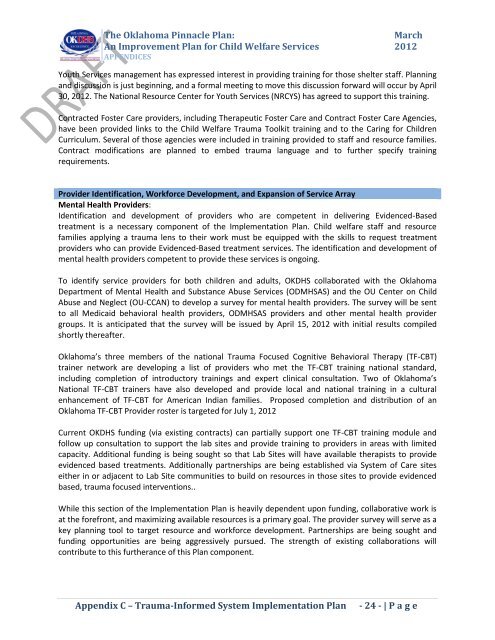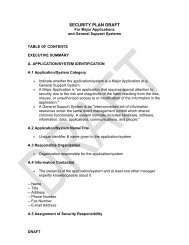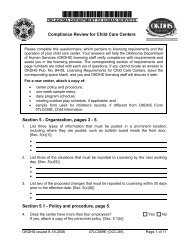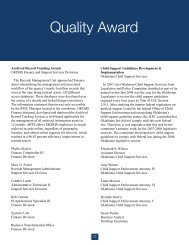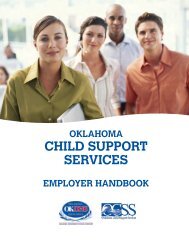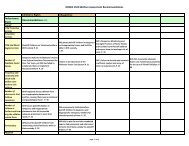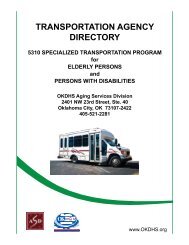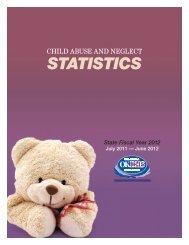The Oklahoma Pinnacle Plan - Oklahoma Department of Human ...
The Oklahoma Pinnacle Plan - Oklahoma Department of Human ...
The Oklahoma Pinnacle Plan - Oklahoma Department of Human ...
You also want an ePaper? Increase the reach of your titles
YUMPU automatically turns print PDFs into web optimized ePapers that Google loves.
<strong>The</strong> <strong>Oklahoma</strong> <strong>Pinnacle</strong> <strong>Plan</strong>:<br />
An Improvement <strong>Plan</strong> for Child Welfare Services<br />
APPENDICES<br />
March<br />
2012<br />
Youth Services management has expressed interest in providing training for those shelter staff. <strong>Plan</strong>ning<br />
and discussion is just beginning, and a formal meeting to move this discussion forward will occur by April<br />
30, 2012. <strong>The</strong> National Resource Center for Youth Services (NRCYS) has agreed to support this training.<br />
Contracted Foster Care providers, including <strong>The</strong>rapeutic Foster Care and Contract Foster Care Agencies,<br />
have been provided links to the Child Welfare Trauma Toolkit training and to the Caring for Children<br />
Curriculum. Several <strong>of</strong> those agencies were included in training provided to staff and resource families.<br />
Contract modifications are planned to embed trauma language and to further specify training<br />
requirements.<br />
Provider Identification, Workforce Development, and Expansion <strong>of</strong> Service Array<br />
Mental Health Providers:<br />
Identification and development <strong>of</strong> providers who are competent in delivering Evidenced-Based<br />
treatment is a necessary component <strong>of</strong> the Implementation <strong>Plan</strong>. Child welfare staff and resource<br />
families applying a trauma lens to their work must be equipped with the skills to request treatment<br />
providers who can provide Evidenced-Based treatment services. <strong>The</strong> identification and development <strong>of</strong><br />
mental health providers competent to provide these services is ongoing.<br />
To identify service providers for both children and adults, OKDHS collaborated with the <strong>Oklahoma</strong><br />
<strong>Department</strong> <strong>of</strong> Mental Health and Substance Abuse Services (ODMHSAS) and the OU Center on Child<br />
Abuse and Neglect (OU-CCAN) to develop a survey for mental health providers. <strong>The</strong> survey will be sent<br />
to all Medicaid behavioral health providers, ODMHSAS providers and other mental health provider<br />
groups. It is anticipated that the survey will be issued by April 15, 2012 with initial results compiled<br />
shortly thereafter.<br />
<strong>Oklahoma</strong>’s three members <strong>of</strong> the national Trauma Focused Cognitive Behavioral <strong>The</strong>rapy (TF-CBT)<br />
trainer network are developing a list <strong>of</strong> providers who met the TF-CBT training national standard,<br />
including completion <strong>of</strong> introductory trainings and expert clinical consultation. Two <strong>of</strong> <strong>Oklahoma</strong>’s<br />
National TF-CBT trainers have also developed and provide local and national training in a cultural<br />
enhancement <strong>of</strong> TF-CBT for American Indian families. Proposed completion and distribution <strong>of</strong> an<br />
<strong>Oklahoma</strong> TF-CBT Provider roster is targeted for July 1, 2012<br />
Current OKDHS funding (via existing contracts) can partially support one TF-CBT training module and<br />
follow up consultation to support the lab sites and provide training to providers in areas with limited<br />
capacity. Additional funding is being sought so that Lab Sites will have available therapists to provide<br />
evidenced based treatments. Additionally partnerships are being established via System <strong>of</strong> Care sites<br />
either in or adjacent to Lab Site communities to build on resources in those sites to provide evidenced<br />
based, trauma focused interventions..<br />
While this section <strong>of</strong> the Implementation <strong>Plan</strong> is heavily dependent upon funding, collaborative work is<br />
at the forefront, and maximizing available resources is a primary goal. <strong>The</strong> provider survey will serve as a<br />
key planning tool to target resource and workforce development. Partnerships are being sought and<br />
funding opportunities are being aggressively pursued. <strong>The</strong> strength <strong>of</strong> existing collaborations will<br />
contribute to this furtherance <strong>of</strong> this <strong>Plan</strong> component.<br />
Appendix C – Trauma-Informed System Implementation <strong>Plan</strong><br />
- 24 - | P a g e


